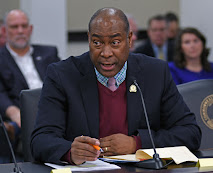Pandemic state of emergency would end March 7 under a resolution the state Senate sent to the House on a party-line vote

Sen. Donald Douglas (Legislative photo)
—–
By Melissa Patrick
Kentucky Health News
The Senate has sent the House a resolution to end the Covid-19 state of emergency in Kentucky on March 7.
Senate Joint Resolution 150, sponsored by Republican Sen. Donald Douglas of Nicholasville, would end the state of emergency that Democratic Gov. Andy Beshear declared on March 6, 2020. In January, the legislature set it to expire on April 15.
The resolution would end “all subsequent executive orders, emergency administrative regulations, suspensions of statutes, and other directives which rely upon the declaration of emergency.”
And it says the governor “shall not” declare a new Covid-19 state of emergency “based upon the same or substantially similar facts and circumstances as the original declaration” without the prior approval of the General Assembly.
The resolution passed the Senate Thursday, Feb. 24. on a party-line vote of 28-8. Including Douglas, the resolution has 18 sponsors.
While presenting the bill on the Senate floor, Daniels acknowledged that when the virus was first announced, there were many unknowns that drove decision-making, but he said it quickly turned political.
“Instead of proceeding down a purely medical path, it seems that politics took a major role and sometimes even the lead,” said Douglas, a physician. “The emergency seemed to be more about emotion and feeling and a lot less about objectivity and facts.”
He said the focus has been on cases and deaths, without an understanding that “many more people recovered without issue,” causing our citizens to be “terrified.” As of Feb. 25, there have been 1.3 million Covid-19 cases in Kentucky and 13,758 deaths attributed to it, most in people over 60. However, as many as a third of people with Covid-19 have reported lingering effects.
Douglas noted that the state of emergency led to cancellation of elective medical procedures, business shutdowns, loss of jobs, mask mandates and travel restrictions, and said “the Kentucky State Police were directed to target church attendees.”
When Douglas presented the bill in committee, he said Beshear ordered police “to pull the attendees of the church out of the church.” That is not true. Beshear ordered police to go to parking lots of churches that held in-person services on Easter 2020 and place notice on cars saying that attendees were in violation of his order against mass gatherings and should quarantine themselves for 14 days.
Douglass also cited a Johns Hopkins University meta-analysis of 24 studies that looked at the effects of lockdowns on Covid-19 deaths. The researchers found lockdowns in the U.S. and Europe reduced Covid-19 mortality by an average of 0.2 percent; that shelter-in-place orders reduced mortality by 2.9%; and that there was no broad-based evidence of noticeable effects from non-pharmaceutical interventions.
The study concluded, “While this meta-analysis concludes that lockdowns have had little to no public-health effects, they have imposed enormous economic and social costs where they have been adopted. In consequence, lockdown policies are ill-founded and should be rejected as a pandemic policy instrument.”
Douglas said, “It is time to move to normalcy.” He said the March 7 date would give Beshear time to file any administrative regulations that are needed and ensure that the lawmakers are still in session when the emergency ends.
He added that it is not his intent to decrease or interfere with any federal funding, but Sen. Morgan McGarvey, D-Louisville, said it remains unknown if the resolution would affect federal funding such as the additional nutrition benefits that have been made available to children and families.
Sen. Karen Berg, D-Louisville, also spoke against the resolution, saying it is premature because the percentage of Kentuckians testing positive for the virus remains too high and only 60% of eligible Kentuckians have received even a single dose of a Covid-19 vaccine.
When Berg spoke, the positive-test rate was around 10%, after being above 30% for much of January. Early in the pandemic, public-health officials said caution is required when the rate is above 5%.
Vaccination rates are also slowing. Over the last seven days, the average number of Covid-19 vaccinations in Kentucky was 2,508 per day, the lowest since the Centers for Disease Control and Prevention began gathering reliable data in January 2020. Most of the shots were boosters. State and CDC data show that 64% of the total population have received at least one dose of a vaccine, 56% are fully vaccinated and 43% of the eligible population is boosted.
Sen. David Yates, D-Louisville, asked his colleagues, “Why are we doing it? This doesn’t change anything. . . . I actually cannot wait until I can join in support of it, but what is the rush? I vote no.”